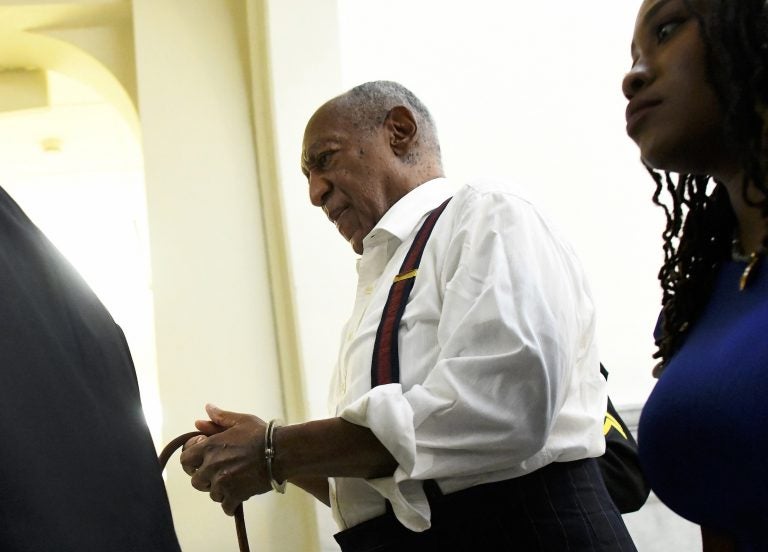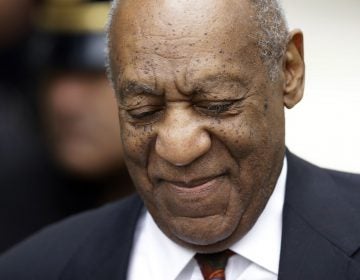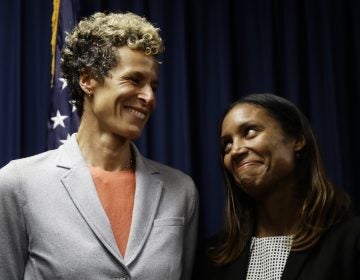Judge sentences Bill Cosby to 3-10 years in state prison
A Montgomery County judge sentenced disgraced comedian Bill Cosby to three to ten years in state prison
Listen 4:31
Bill Cosby is taken away in handcuffs after he was sentenced to three-to 10-years for felony sexual assault on Tuesday, Sept. 25, 2018, in Norristown, Pa. (Mark Makela/Pool Photo via AP)
UPDATED: 4:30 p.m.
A Montgomery County judge sentenced disgraced comedian Bill Cosby to three to 10 years in state prison Tuesday, saying words of Cosby’s main accuser Andrea Constand that the entertainer took her “beautiful, young spirit and crushed it” helped him reach his decision.
“It is time for justice, Mr. Cosby,” said Montgomery County Judge Steven O’Neill. “This has all circled back to you.”
The punishment, seen as the first celebrity prison sentence in the #MeToo era, is on the higher-end of Pennsylvania’s guidelines for someone who has been convicted of aggravated indecent assault. Cosby’s lawyers argued over two days that the entertainer should be placed on house arrest. Prosecutors maintained that the maximum possible punishment of a decade of confinement was appropriate.
Judge Steven O’Neill sentenced 81 year-old Bill Cosby to a minimum of 3 years in state prison. On Cosby’s plummet from his once-high perch in society, he said:
“The more precious the gift, the more shameful its loss. I recognize that impact on you, Mr. Cosby, and I am sorry.”
— Laura Benshoff (@LEBenshoff) September 25, 2018
When his punishment was read, Cosby appeared not to react. Cosby’s wife, Camille, who stridently criticized the judge in the days leading up to the hearing, was not present.
Immediately after the judge handed down his sentence, Cosby’s lawyers asked that the 81-year-old be released on bail as he begins the appeals process. O’Neill denied the request, ordering that Cosby immediately enter custody.
Cosby took off his jacket and rolled up his sleeves, and could be seen laughing with his legal team before sheriff’s deputies handcuffed him and escorted him out of the courtroom. As he shuffled by a sea of reporters wearing red-and-blue suspenders, the comedian’s thin wooden cane was between his handcuffed wrists.
Bill Cosby’s booking photo at Montgomery County jail. He will be transported to state prison shortly, county spokeswoman says. pic.twitter.com/8NE8kZnhCr
— Laura McCrystal (@LMcCrystal) September 25, 2018
Asked for comment, Cosby looked down and said nothing. But after the hearing, outside the courthouse as rain trickled down, Andrew Wyatt, Cosby’s spokesman, vowed to fight the sentence and implied that the prosecution was racially biased.
“Mr. Cosby knows that these are lies,” Wyatt said. “They prosecuted Jesus and look what happened. Not saying Mr. Cosby is Jesus, but we know what this country has done to black men for centuries.”
The sentence means that after three years, Cosby would be eligible to be released on parole. If officials deem he has met his requirements in prison and can be released, he will have to attend monthly counseling and report his travels to state police, rules mandated by the judge declaring that Cosby should be considered a “sexually violent predator.”
Cosby has also been ordered to pay a $25,000 fine.
Prosecutors also asked the court to require Cosby to cover the cost of his two trials, which added up to about $420,000.
After pushback from Cosby’s defense saying he has legitimate appeal issues, judge stands firm: Bill Cosby will not be released on bail before he begins his sentence in state prison.
Sheriff’s deputies have surrounded Cosby,wearing red suspenders, as he prepares to get arrested.
— Bobby Allyn (@BobbyAllyn) September 25, 2018
Cosby took off his watch, tie and jacket. Sheriff’s deputies are waiting nearby to take him away. Court administrators are clearing the room.
— Laura Benshoff (@LEBenshoff) September 25, 2018
Judge designates Cosby a sexually violent predator
Prior to sentencing, O’Neill designated Cosby a sexually violent predator, mandating counseling and regular check-ins with state police. When this decision was read, one of his accusers, model Janice Dickinson, seated in the third row, made a celebratory gesture in the air and hugged the person next to her.
Cosby’s attorney requested bail pending appeal, which O’Neill denied.
Cosby’s prison sentence completes the TV dad’s stunning fall from groundbreaking cultural icon to convicted sex offender. The punishment also establishes Cosby as the first celebrity sent to prison the #MeToo era.
After becoming the first African-American actor to star in a lead role in the buddy-cop show “I Spy” in 1965, Cosby’s acting career made him a household name. He has been a cultural fixture ever since, starring in films, television shows, and putting out comedy albums for decades. His body of work developed his legacy as “America’s Dad,” in particular his depiction of obstetrician Cliff Huxtable on “The Cosby Show,” which ran for eight seasons until 1992.
Those contributions to American popular culture have now been eclipsed by his conviction as well as allegations of sexual misconduct leveled by dozens of accusers, largely women with aspiring entertainment careers, stretching back to the mid-1960s.
“In many respects, I think this was the precursor to the furor that ignited with the Harvey Weinstein allegations surfacing,” said Deborah Tuerkheimer, law professor at Northwestern University.
In 2005, Andrea Constand, who was 32 years old at the time, reported to police in her native Ontario that Cosby had given her three blue pills and fondled her while she was incapacitated. Canadian police referred the case to authorities in Montgomery County, Pennsylvania. Then-District Attorney Bruce Castor declined to press charges. Constand then pursued a civil lawsuit against the entertainer that was settled for $3.4 million.
Fast forward to 2015 and at the request of the Associated Press, U.S. District Judge Eduardo Robreno unsealed deposition testimony Cosby gave during that civil case in which he described obtaining Quaaludes to give women before sex. That revelation set off scores of other women to step forward and say Cosby drugged and molested or sexually assaulted them.
The document also renewed interest in the District Attorney’s office to re-examine Constand’s criminal case.
Days before the statute of limitations was set to expire, prosecutors summoned reporters to Montgomery County, in December 2015, to make a startling announcement: Cosby was being charged with three counts of aggravated indecent assault over a more than decade-old incident.
In the two and a half years that followed, Cosby’s case went to trial twice in Norristown, Pa., not far from his estate where Constand says Cosby assaulted her.
The first jury deadlocked in 2017. A jury in the second trial convicted Cosby on all counts April 26, 2018.
Both times, Constand testified that during a visit to his house in 2004, Cosby gave her pills she believed were herbal supplements to help with stress she was having as she was considering a career change. When she took down the pills, she was knocked unconscious. She told jurors, while on a couch in his home and in a haze, she felt him penetrating her with his fingers and using her hand to masturbate, as she was unable to fight back. “I was frozen,” she told the jury.
After six days of deliberation, jurors failed to reach a unanimous verdict, resulting in a mistrial. Prosecutors did not give up, though, deciding to put Cosby on trial a second time. In April 2018, Cosby faced a different jury and, in many ways, a whole new world.
For one, the #MeToo movement had been unleashed, toppling bad-behaving men whose abuse had previously been kept secret. And the judge allowed five women in addition to Constand to take the stand and confront the famous comedian to help illustrate Cosby’s pattern of predatory behavior. That was four more women than the judge permitted during the first trial. Legal experts say those women helped bolster the credibility of Constand.
When the women took the witnesses stand, a pattern emerged. The women told the court that Cosby sought them out and gained their trust before arranging for private meetings, often under the guise of career advice or script coaching, where Cosby would drug them then sexually prey on them.
Among the five women who took the stand in the second trial was model Janice Dickinson, who, along with the other accuser witnesses, Cosby’s lawyers attempted to paint as a fame-seeking liar who had fabricated stories to smear a famous person.
“You said words to the effect that, ‘For 30 years, I didn’t know I had been raped,’” said Cosby attorney Thomas Mesereau to accuser Janice Baker-Kinney during cross-examination. “So, for 30 years, you didn’t think anyone had sexually assaulted you?”
“It still takes me everything within my being to say the words ‘I was raped,’ because I still carry the guilt,’ ” responded Baker-Kinney.
Throughout the proceedings, Cosby’s legal team maintained the comedian’s innocence, arguing that the encounter with Constand was consensual. In the first trial, Cosby’s lawyers emphasized an alleged mutual romance between Cosby and Constand. With a retooled legal team, Cosby’s lawyers had a new approach: attempting to portray Constand as a “con artist” who had long planned to concoct a false allegation against Cosby in order to secure a multi-million-dollar payout.
—
This is a developing story and will be updated.
WHYY is your source for fact-based, in-depth journalism and information. As a nonprofit organization, we rely on financial support from readers like you. Please give today.




